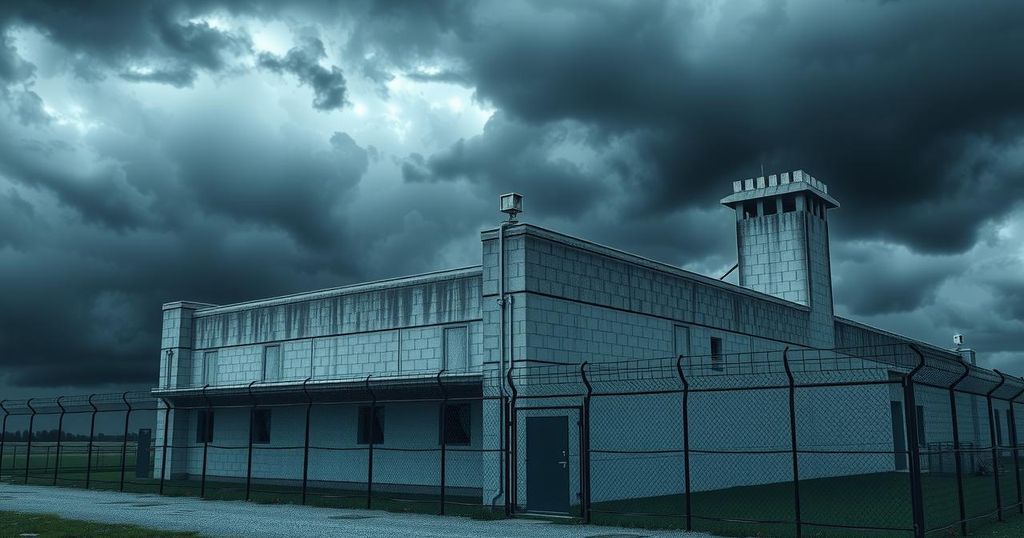Business
economics
ASIA, ASSOCIATED PRESS, CECOT, CUBA, DONALD TRUMP, DRUG TRAFFICKING, ECONOMY, EL SALVADOR, IMPRISONMENT, JAMES E. BOASBERG, KA, KAROLINE LEAVITT, LEAVITT, LEGAL, MARCO RUBIO, MONEY LAUNDERING, NAY, NAYIB BUKELE, NORTH AMERICA, PHILIPPINES, SOUTH AMERICA, TERRORISM CONFINEMENT CENTRE, TREN DE ARAGUA, UNITED STATES, US, US STATE DEPARTMENT, VENEZUELA
Leila Ramsay
0 Comments
US and El Salvador Enter Controversial $6 Million Prison Agreement for Gang Members
El Salvador has received 238 alleged members of Venezuela’s Tren de Aragua gang and 23 MS-13 members from the US under a $6 million deal to house them in a maximum-security prison. This unprecedented arrangement aims to create a self-sustainable prison system for El Salvador, facing significant public debt. Despite legal controversies surrounding deportations, the agreement signals shifts in international correctional strategies and raises concerns among human rights advocates.
El Salvador has accepted 238 alleged members of Venezuela’s Tren de Aragua gang and 23 MS-13 members from the United States, marking a significant development in cross-border incarceration practices. These individuals are now held at the Central American nation’s maximum-security Terrorism Confinement Centre (CECOT), an unprecedented arrangement confirmed by officials from both nations.
The agreement, proposed during US Secretary of State Marco Rubio’s visit last month, carries substantial financial implications. The United States will pay El Salvador $6 million to detain approximately 300 individuals for one year, with options for renewal. Given El Salvador’s public debt of $31 billion, which constitutes 82% of its GDP, President Nayib Bukele views this agreement as essential for creating a self-sustaining prison system.
The cost of housing each prisoner is reported to be around $20,000 annually. Furthermore, a document from the US State Department suggests that an additional allocation of $15 million may be provided to facilitate the detention of more gang members in El Salvador under this arrangement.
This initiative proceeded despite a legal challenge in the US, where District Judge James E. Boasberg issued a temporary order to suspend deportations. However, the White House maintained that the deportees were no longer within US territory when the ruling was issued on March 15. Press Secretary Karoline Leavitt emphasized the government’s position, stating, “A single judge in a single city cannot direct the movements of an aircraft carrier full of foreign alien terrorists who were physically expelled from US soil.”
Deportations were conducted under the 1798 Alien Enemies Act, invoked by President Donald Trump, who described the Venezuelan gang as an “invasion”. This legal framework allowed for expedited deportations without usual legal protections.
The CECOT, a $70 million facility opened in 2023 with the capacity for 40,000 inmates, is central to this agreement. El Salvador seeks to offer this prison to other countries, notably the United States, where public correctional expenditure amounts to $80.7 billion annually. President Bukele’s firm approach has transformed El Salvador from a perilous nation into one of the safest in Latin America.
However, the facility has faced criticism from human rights organizations. NGO Cristosal highlights issues such as the prohibition of visitations, lack of outdoor access, and absence of rehabilitation programs within the prison. Reports indicate that 261 deaths have occurred in Salvadoran prisons amid the gang crackdown, raising alarms with the Inter-American Commission on Human Rights regarding prison conditions.
Family members of the deported individuals assert that many were not criminals but turned themselves in due to dire economic circumstances. One relative expressed on social media, “Many turned themselves in to US authorities because they could no longer sustain their economic situation there, but they are not criminals.”
Venezuela’s government criticized the deportations as a form of criminalizing migration, likening it to historical atrocities. The rationale behind transferring the alleged criminals to El Salvador instead of repatriating them remains unclear, especially as Venezuela had recently accepted the resumption of repatriation flights.
This innovative agreement may set a precedent for international detention outsourcing, with a growing interest from other nations such as Chile. Analysts note that this arrangement signals broader changes in global approaches to corrections management, drawing comparisons to the localized incarceration economy in America’s “Prison Valley.”
The partnership between Trump and Bukele, both recognized for their rigid crime and immigration policies, appears to be fortifying. The agreement not only addresses prison overcrowding in the US but also reflects a firm attitude towards immigration and transnational crime. As these international incarceration strategies surface, they merit careful observation from policymakers and human rights advocates to navigate potential implications in the future.
The recent agreement between the United States and El Salvador to detain alleged gang members marks a transformative moment in international incarceration practices. With significant financial implications and the potential for replication in other nations, this model reflects broader shifts in justice systems. The collaboration between Trump and Bukele highlights the impact of stringent crime policies, while raising crucial concerns regarding human rights and the conditions of foreign prisons. Close scrutiny of this arrangement and its consequences is essential as it may redefine conventional approaches to detention outsourcing in the future.
Original Source: www.intellinews.com




Post Comment